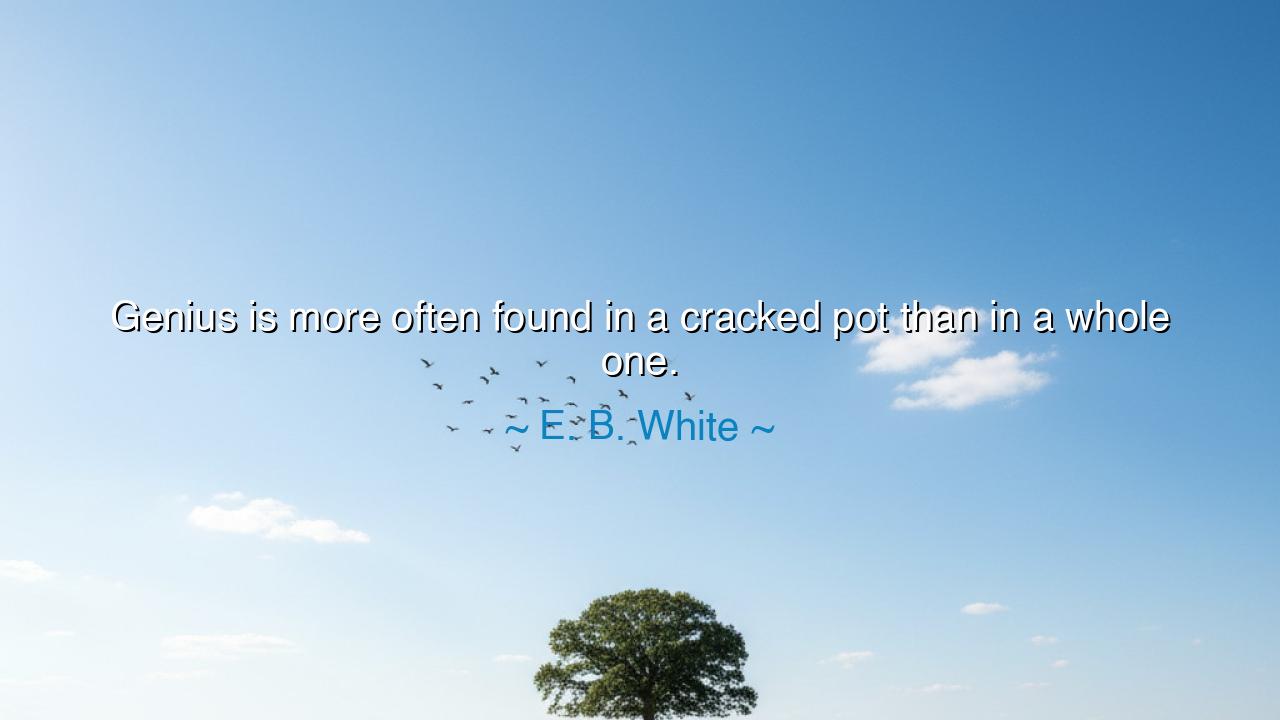
Genius is more often found in a cracked pot than in a whole one.






“Genius is more often found in a cracked pot than in a whole one.” Thus spoke E. B. White, reminding humankind that brilliance seldom resides in perfection, but rather in the flawed, the broken, and the misunderstood. The ancients knew this truth well: that light finds its way through the cracks, and that the vessel which leaks a little may water the flowers along the path. The perfect pot, sealed and polished, may hold its water well, but it nourishes nothing beyond itself. The cracked pot, though marred, becomes an instrument of hidden grace.
In this saying lies a profound observation of the human spirit. The world often bows before symmetry and soundness, admiring the unblemished face, the smooth voice, the orderly mind. Yet it is in the uneven rhythm, the unpolished soul, that the fire of creation burns brightest. Genius is not the child of comfort or conformity—it is born from struggle, fracture, and the restless ache of imperfection. Where others see weakness, genius perceives possibility. Where others despair, genius imagines a new dawn.
Think of Vincent van Gogh, whose spirit trembled like a candle in the wind. The world called him mad, a man cracked beyond repair. Yet through those very cracks, color and emotion poured forth onto canvas with the force of divine revelation. His sunflowers blazed against despair; his skies swirled with the pulse of the eternal. He was a pot shattered by sorrow, yet his fragments became a mirror of beauty for generations unborn. What, then, is madness but the raw material from which genius sometimes sculpts its vision?
The ancients would have said that the gods favor the wounded. In the myths of old, the heroes who bore scars were the ones chosen to carry fire to mankind. Prometheus defied heaven and suffered for it, yet his pain gave light to the world. So too, those who carry the burden of a cracked soul often become vessels for truths the unbroken cannot comprehend. Their very fractures make them sensitive to the tremors of the universe. In their pain lies perception; in their longing, the seed of invention.
We must learn, then, to honor our own imperfections. The world may call them flaws, but the wise know they are gateways to genius. To be cracked is to be human; to hide the crack is to deny the passage through which inspiration may enter. Let the water of your heart spill a little—let it nourish something beyond your own containment. Do not fear being misunderstood, for every great soul has walked that lonely road where laughter and ridicule echo more loudly than applause.
Yet genius is not merely bestowed—it must be cultivated through courage. The cracked pot that lies in the sun does not despair of its leaks; it learns how to use them. So, too, must we turn our failings into fountains of wisdom. When you falter, ask not, “Why am I broken?” but rather, “How can this opening let light through?” For the true artist, thinker, or dreamer, every flaw is a doorway through which the divine breathes new form into the world.
So, dear soul, when next you behold your reflection and see imperfection, rejoice. You are among the chosen—the ones through whom the river of life flows freely. The whole pot may rest secure, admired upon the shelf, but it remains silent, unmoving. The cracked pot journeys, leaks, loves, and gives. It lives its purpose not by preservation, but by participation. Be that vessel. Embrace your cracks, for they are the marks of your becoming.
And the lesson, eternal and clear, is this: do not seek to be perfect—seek to be alive. Pour yourself into the world, even if you spill. Use your wounds as instruments of compassion, your flaws as sources of strength. Let your cracks sing the song of your truth, for it is there—in that trembling imperfection—that genius takes root, and through it, the world is made more whole.






AAdministratorAdministrator
Welcome, honored guests. Please leave a comment, we will respond soon